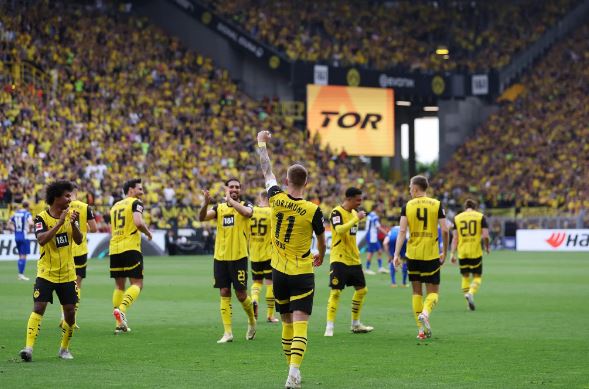Borussia Dortmund, one of Germany’s premier soccer clubs, has always been deeply connected to the industrial Ruhr region, cherishing its working-class heritage, community involvement, and rebellious spirit. Yet, on the brink of one of the most significant matches in its history, the club finds itself at the center of a controversy. The uproar stems from a newly inked sponsorship deal with Rheinmetall, a leading German arms manufacturer. This partnership has ignited a fiery debate about the increasing militarization in German society, overshadowing Dortmund’s preparation for the Champions League final against Real Madrid this Saturday.
The three-year deal, announced on Wednesday, grants Rheinmetall advertising and marketing rights within Dortmund’s stadium and club grounds, but importantly, does not extend to the team’s iconic black and yellow jerseys.
For many Germans, particularly those raised on the postwar mantra of “never again” inciting armed conflict, the association with the defense industry is unsettling. Unlike the United States, where military displays are commonplace at sporting events, Germany has traditionally shied away from such overt patriotism. Many Dortmund fans are eager to maintain this tradition.
Germany’s economy minister, Robert Habeck, echoed this sentiment, arguing that the sponsorship mirrors Europe’s current geopolitical landscape. Germany has provided around $30 billion in military support to Ukraine, including munitions, tanks, and other equipment from Rheinmetall.
Rheinmetall has seen its business thrive since Russia’s full-scale invasion of Ukraine in 2022. The company’s stock price has surged sixfold over the past three years, buoyed by contracts such as those for the Leopard tanks sent to Ukraine by Germany and its NATO allies. Rheinmetall’s CEO, Armin Papperger, anticipates that the company will receive about a third of the €100 billion ($109 billion) pledged by Chancellor Olaf Scholz to revitalize the German military.
Dortmund’s financial situation has also been buoyed by its strong performance in the Champions League. The club, which is member-controlled and the only German team with publicly traded shares, has twice upgraded its financial forecasts this year. It now expects a net profit of up to €50 million, roughly double its initial target for the season.
Despite the sponsorship controversy, Dortmund’s sporting director, Sebastian Kehl, prefers to keep the focus on the upcoming match. Fan influence is a powerful force in German soccer, with supporters frequently staging protests against decisions perceived as overly commercial or compromising the sport’s integrity.
Anna Neumann, involved in local politics in North Rhine-Westphalia and a Dortmund supporter, noted that many English Premier League teams have sponsorships with gambling companies and firms linked to human rights concerns.
As Borussia Dortmund gears up for the Champions League final against Real Madrid, the sponsorship debate highlights the complex interplay between sports, business, and societal values in modern Germany.

